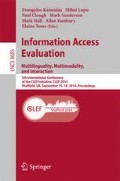Abstract
We present two new measures of retrieval effectiveness, inspired by Graded Average Precision(GAP), which extends Average Precision(AP) to graded relevance judgements. Starting from the random choice of a user, we define Extended Graded Average Precision(xGAP) and Expected Graded Average Precision(eGAP), which are more accurate than GAP in the case of a small number of highly relevant documents with high probability to be considered relevant by the users. The proposed measures are then evaluated on TREC 10, TREC 14, and TREC 21 collections showing that they actually grasp a different angle from GAP and that they are robust when it comes to incomplete judgments and shallow pools.
Access this chapter
Tax calculation will be finalised at checkout
Purchases are for personal use only
Preview
Unable to display preview. Download preview PDF.
References
Buckley, C., Voorhees, E.M.: Retrieval Evaluation with Incomplete Information. In: SIGIR 2007, pp. 25–32. ACM Press, USA (2004)
Buckley, C., Voorhees, E.M.: Retrieval System Evaluation. In: TREC. Experiment and Evaluation in Information Retrieval, pp. 53–78. MIT Press, USA (2005)
Clarke, C.L.A., Craswell, N., Voorhees, H.: Overview of the TREC 2012 Web Track. In: TREC 2012, pp. 1–8. NIST, Special Publication 500-298, USA (2013)
Hawking, D., Craswell, N.: Overview of the TREC-2001 Web Track. In TREC 2001, pp. 61–67. NIST, Special Publication 500-250, USA (2001)
Järvelin, K., Kekäläinen, J.: Cumulated Gain-Based Evaluation of IR Techniques. ACM Transactions on Information Systems (TOIS) 20(4), 422–446 (2002)
Kendall, M.G.: Rank correlation methods. Griffin, Oxford (1948)
Moffat, A., Zobel, J.: Rank-biased Precision for Measurement of Retrieval Effectiveness. ACM Transactions on Information Systems (TOIS) 27(1), 2:1–2:27 (2008)
Resnick, S.I.: A Probability Path. Birkhäuser, Boston (2005)
Robertson, S.E., Kanoulas, E., Yilmaz, E.: Extending Average Precision to Graded Relevance Judgments. In: SIGIR 2010, pp. 603–610. ACM Press, USA (2010)
Voorhees, E.: Evaluation by Highly Relevant Documents. In: SIGIR 2001, pp. 74–82. ACM Press, USA (2001)
Voorhees, E.M.: Overview of the TREC 2005 Robust Retrieval Track. In: TREC 2005. NIST, Special Pubblication 500-266, USA (2005)
Author information
Authors and Affiliations
Editor information
Editors and Affiliations
Rights and permissions
Copyright information
© 2014 Springer International Publishing Switzerland
About this paper
Cite this paper
Ferrante, M., Ferro, N., Maistro, M. (2014). Rethinking How to Extend Average Precision to Graded Relevance. In: Kanoulas, E., et al. Information Access Evaluation. Multilinguality, Multimodality, and Interaction. CLEF 2014. Lecture Notes in Computer Science, vol 8685. Springer, Cham. https://doi.org/10.1007/978-3-319-11382-1_3
Download citation
DOI: https://doi.org/10.1007/978-3-319-11382-1_3
Publisher Name: Springer, Cham
Print ISBN: 978-3-319-11381-4
Online ISBN: 978-3-319-11382-1
eBook Packages: Computer ScienceComputer Science (R0)

